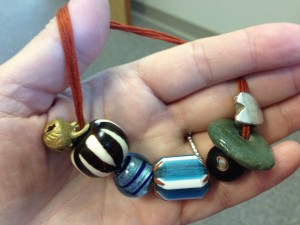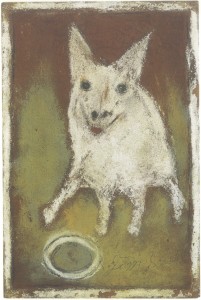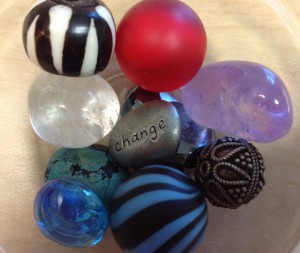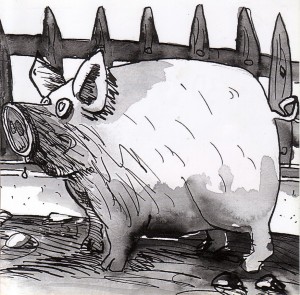Perfect
 At the Hi-Pointe Sitting Group last night….just as we were starting the meditation…someone, somewhere in the building, started practicing the drums.
At the Hi-Pointe Sitting Group last night….just as we were starting the meditation…someone, somewhere in the building, started practicing the drums.
Such is life.
It would have been even more fitting if I had brought the passage that I had planned to read, which is a teaching from Ajahn Chah, titled: Who is Bothering Whom?:
“In our practice, we think that noises, cars, voices, sights, are distractions that come and bother us when we want to be quiet. But who is bothering whom?
“Actually, we are the ones who go and bother them. The car, the sound, is just following its own nature.
“We bother things through some false idea that they are outside us and cling to the ideal of remaining quiet, undisturbed.
“Learn to see that it is not things that bother us, that we go out to bother them. See the world as a mirror. It is all a reflection of mind.
“When you know this, you can grow in every moment, and every experience reveals truths and brings understanding.”
–from A Still Forest Pool: The Insight Mediation of Achaan Chah, by Jack Kornfield and Paul Breiter
(image from A Whole World, by Couprie and Louchard)
Receiving with Generosity
The latest issue of Spirit Rock News includes an excerpt from Phillip Moffitt‘s terrific new book, Emotional Chaos to Clarity: How to Live More Skillfully, Make Better Decisions, and Find Purpose in Life.
The excerpt is about generosity, which “does not mean self-sacrifice or reckless giving everything away. Such acts,” Phillip writes, “are actually grandiosity disguised as generosity.”
I love that he talks about generosity in such, well….generous terms. He says, “In daily life, generosity means receiving each moment with a generous attitude and meeting it with patience.”
 “When interacting with friends or strangers, you give them your full attention as you listen to their words, and you interpret their actions with sympathy, even when they are clumsy.
“When interacting with friends or strangers, you give them your full attention as you listen to their words, and you interpret their actions with sympathy, even when they are clumsy.
“You cultivate magnanimous thoughts that allow you to see others in their best light and to interpret their actions as well-meaning until proven otherwise.
“Being generous in your thoughts doesn’t mean that you’re naive or that you permit a wrong action to go uncorrected. Rather, it means that you treat every one as innately worthy of your respect and care.”
What a beautiful way to live.
(image from “Offerings,” by Danielle and Olivier Follmi)
Note: Dharma Town Times got hit last night with a major spam attack, so I’ve temporarily closed the comments section. You can always send a comment directly to me here.
Engaged
The topic for this month’s DPP homework is Socially Engaged Buddhism. There’s a lot of reading this month, which I expect I will be posting about later on, but one of the reflections and related practice exercises has already captured my attention.
 The question is: How do I work with strong emotions…such as anger, despair, sadness, etc…..that arise about the state of the world?
The question is: How do I work with strong emotions…such as anger, despair, sadness, etc…..that arise about the state of the world?
The practice is: When you notice yourself with a fixed opponent or “enemy”….someone you know or a public figure….investigate how you think, feel, and speak about this person, and notice if you are developing a strongly polarized position in relationship to him/her.
Hmmmm.
(image from Phaidon Portraits)
“Dancing” Tonight
Tonight the Monday night “Dancing” KM Group meets for our on-going discussion of “Dancing with Life,” by Phillip Moffitt. So far, we’ve read to the end of Chapter 6, “The Call to Know That You Know.” As always, we bring a sentence, phrase or paragraph from the current reading to discuss with the group.
I’ve chosen a couple of snippets from various paragraphs on page 61:
 “….beginner’s mind requires you to forsake your desires and ideas about what you will accomplish.”
“….beginner’s mind requires you to forsake your desires and ideas about what you will accomplish.”
“The Buddha cautioned: ‘The future is always other than you imagined it.'”
“Look to those far lofty peaks of enlightenment, heaven, or paradise for inspiration, but live in the now. For in this moment, you are either creating suffering for yourself and others, or you are not.”
(I hope I am not.)
(image from A Whole World, by Couprie and Louchard)
7 Things on a String
 I had such a good time finding 10 Things to represent the 10 Perfections (which I wrote about here), that I decided to do something similar for the 7 Factors of Awakening.
I had such a good time finding 10 Things to represent the 10 Perfections (which I wrote about here), that I decided to do something similar for the 7 Factors of Awakening.
This time I chose things I could string. I started with a little brass bell for mindfulness (sati), then bone, glass and clay beads for investigation (dhamma-vicaya), energy (viriya), joy (piti), and tranquility (passaddhi), a polished jade circle for concentration (samadhi), and a little silver heart for equanimity (upekkha).
I’m not sure what I’m going to do with them now. The string is a little too heavy to wear as a bracelet, but I like having it on my desk and picking it up every now and then. It makes a nice little jingling sound that I find…well….pleasant.
I also like that it reminds me of what U Tejaniya says about the 7 Factors: “The first three factors — mindfulness, investigation and energy — are causes. The latter four — joy, tranquility, concentration and equanimity — are effects. We need to cultivate the causes, because these are what we can work on. We don’t need to do anything for the effects. We can’t create them, nor can be make them happen.”
Dharma Perfume
Last night at the Hi-Pointe Sitting Group, I closed the sit by reading a few verses from The Dhammapada. I chose Gil Fronsdal‘s translation, not only because I think the language is clear and beautiful, but also because the book includes this introduction, written by Jack Kornfield:
 “…These teachings in the Dhammapada are as true now as the moment they were offered from the Buddha’s own lips. One page, one verse alone, has the power to change your life.
“…These teachings in the Dhammapada are as true now as the moment they were offered from the Buddha’s own lips. One page, one verse alone, has the power to change your life.
“Do not merely read these words but take them in slowly, savor them. Let them touch your heart’s deepest wisdom. Let your understanding grow. Seeing what is true, put these words into practice. Then, as the text says, let the fragrance of your virtue spread farther than the smell of rosebay and jasmine, farther than even the winds can blow.
“Let the practice release your heart from fear. Let the quieting of your mind and the clear seeing of the truth release you from confusion and clinging.”
Here are the verses we savored last night:
“All experience is preceded by mind,
Let by mind,
Made by mind.
Speak or act with a corrupted mind,
And suffering follows
As the wagon wheel follows the hoof of the ox.
“All experience is precede by mind,
Led by mind,
Made by mind.
Speak or act with a peaceful mind,
And happiness follows
Like a never-departing shadow.”
Listen to This (without the all-CAPS)
I subscribe to Dharma Seed podcasts, so I listen to a lot of dharma talks. Most of them are very good…a few, I must admit are tedious…but some are so beautiful and inspiring that it’s all I can do not to fire off e-blasts to everyone I know, saying LISTEN TO THIS!!!! (We all know how welcome those emails are.)
So instead, I’ll just post the link here!
Pascal Auclair has a terrific talk, titled: On Unconditional Friendliness, Concentration and Other Things. It was recorded during a Metta retreat at True North Insight in Montreal. In the talk, Pascal reads a wonderful poem by Galway Kinnell, which I offer here (as an incentive to listen to the whole talk here.)
The bud
stands for all things,
even those things that don’t flower,
for everything flowers, from within, of self-blessing;
though sometimes it is necessary
to teach a thing its loveliness,
to put a hand on its brow
of the flower
and retell it in words and in touch
it is lovely
until it flowers again from within, of self-blessing;
as St. Francis
put his hand on the creased forehead
of the sow, and told her in words and in touch
blessings of earth on the sow, and the sow
began remembering all down her thick length,
from the earthen snout all the way
through the fodder and slops to the spiritual curl of
the tail,
from the hard spininess spiked out from the spine
down through the great broken heart
to the blue milken dreaminess spurting and shuddering
from the fourteen teats into the fourteen mouths sucking
and blowing beneath them:
the long, perfect loveliness of sow.
(image from A Whole World by Couprie and Louchard)
First Tuesday Tonglen
 Starting next Tuesday, Maplewood Metta will offer Tonglen practice on the first Tuesday of every month.
Starting next Tuesday, Maplewood Metta will offer Tonglen practice on the first Tuesday of every month.
Tonglen is the powerful Tibetan practice of giving and receiving compassion, which fosters wisdom and fearlessness as well as love and compassion toward oneself and others. Scott Newell will lead us in this ancient healing practice.
All are welcome!
Where: The home of Johannes Wich-Schwarz, 28 17 Oakland, Maplewood, MO 63143
When: First Tuesday of every month, 6:30 pm to 7:30 pm
(image from Spirit Rock publications)
It’s All In How You Look At It
 Cindy, Thomas and I sat in Tower Grove park on Saturday morning (as part of the Sitting in the Park group). We don’t normally have a dharma talk, but this time a “teacher” appeared…in the form of a dog, who had been left waiting nearby while his owners were at the Market.
Cindy, Thomas and I sat in Tower Grove park on Saturday morning (as part of the Sitting in the Park group). We don’t normally have a dharma talk, but this time a “teacher” appeared…in the form of a dog, who had been left waiting nearby while his owners were at the Market.
In honor of which, I offer this poem by Billy Collins:
Another Reason Why I Don’t Keep a Gun in the House
The neighbors’ dog will not stop barking.
He is barking the same high, rhythmic bark
that he barks every time they leave the house.
They must switch him on on their way out.
The neighbors’ dog will not stop barking.
I close all the windows in the house
and put on a Beethoven symphony full blast
but I can still hear him muffled under the music,
barking, barking, barking.
and now I can see him sitting in the orchestra,
his head raised confidently as if Beethoven
had included a part for barking dog.
When the record finally ends he is still barking,
sitting there in the oboe section barking,
his eyes fixed on the conductor who is
entreating him with his baton
while the other musicians listen in respectful
silence to the famous barking dog solo,
that endless coda that first established
Beethoven as an innovative genius.
(image by Jimmy Lee Sudduth, from Outsider Art)
10 Things
One of my DPP Dharma Buddies and I have been working together on the homework for this month, part of which is to find creative ways to cultivate the 10 “Perfections” (also called “Paramis”) in our daily life. The 10 Perfections in the Theravada tradition are: generosity, virtue, renunciation, wisdom, persistence, patience, honesty, determination, good will, and equanimity.
 So one thing we’ve decided to do, is to find 10 lovely little things we can hold in our hand–stones, beads, marbles, etc–that can each represent one of these qualities, and then to choose one each day…to carry it with us, or put it next to the computer, or on the windowsill over the sink or wherever…to help us remember to cultivate that particular quality throughout the day.
So one thing we’ve decided to do, is to find 10 lovely little things we can hold in our hand–stones, beads, marbles, etc–that can each represent one of these qualities, and then to choose one each day…to carry it with us, or put it next to the computer, or on the windowsill over the sink or wherever…to help us remember to cultivate that particular quality throughout the day.
I chose a little charm I have with the word “change” engraved on it to represent the quality of equanimity, which is the quality I am focusing on today. When I look at the charm, or feel its smoothness in my hand, I will think:
Things change. No need to get worked up. Gain and loss, praise and blame….these are like storms in the mind. They blow over. And then something else comes along. It’s not about me. It’s the way things are. It’s OK.

